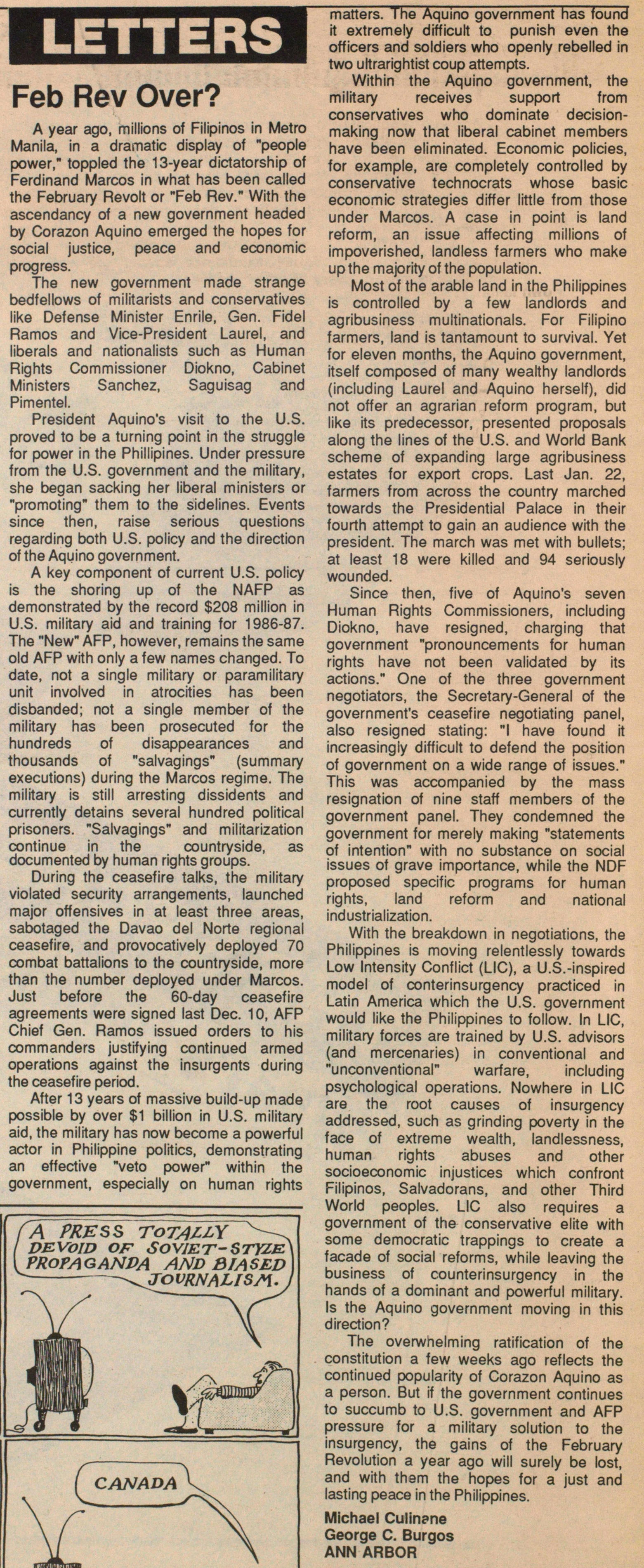Letters

Feb Rev Over?
A year ago, millions of Filipinos in Metro Manila, in a dramatic display of "people power," toppled the 13-year dictatorship of Ferdinand Marcos in what has been called the February Revolt or "Feb Rev." With the ascendancy of a new government headed by Corazon Aquino emerged the hopes for social justice, peace and economic progress.
The new government made strange bedfellows of militarists and conservatives like Defense Minister Enrile, Gen. Fidel Ramos and Vice-President Laurel, and liberals and nationalists such as Human Rights Commissioner Diokno, Cabinet Ministers Sanchez, Saguisag and Pimentel.
President Aquino's visit to the U.S. proved to be a turning point in the struggle for power in the Philippines. Under pressure from the U.S. government and the military, she began sacking her liberal ministers or "promoting" them to the sidelines. Events since then, raise serious questions regarding both U.S. policy and the direction of the Aquino government.
A key component of current U.S. policy is the shoring up of the NAFP as demonstrated by the record $208 million in U.S. military aid and training for 1986-87. The "New" AFP, however, remains the same old AFP with only a few names changed. To date, not a single military or paramilitary until involved in atrocities has been disbanded; not a single member of the military has been prosecuted for the hundreds of disappearances and thousands of "salvagings" (summary executions) during the Marcos regimes. The military is still arresting dissidents and currently detains several hundred political prisoners. "Salvagings" and militarization continue in the countryside, as documented by human rights groups.
During the ceasefire talks, the military violated security arrangements, launched major offensives in at least three areas, sabotaged the Davao del Norte regional ceasefire, and provocatively deployed 70 combat battalions to the countryside, more than the number deployed under Marcos. Just before the 60-day ceasefire agreements were signed last Dec. 10, AFP Chief Gen. Ramos issued orders to his commanders justifying continued armed operations against the insurgents during the ceasefire period.
After 13 years of massive build-up made possible by over $1 billion in U.S. military aid, the military has now become a powerful actor in Philippine politics, demonstrating an effective "veto power" within the government, especially on human rights matters.The Aquino government has found it extremely difficult to punish even the officers and soldiers who openly rebelled in the two ultarightist coup attempts.
Within the Aquino government, the military receives support from conservatives who dominate decision making now that liberal cabinet members have been eliminated. Economic policies, for example, are completely controlled by conservative technocrats whose basic economic strategies differ little from those under Marcos. A case in point is land reform, an issue affecting millions of impoverished, landless farmers who make up the majority of the population.
Most of the arable land in the Philippines is controlled by a few landlords and agribusiness multinationals. For Filipino farmers, land is tantamount to survival. Yet for eleven months, the Aquino government, itself composed of many wealthy landlords (including Laurel and Aquino herself), did not offer an agrarian reform program, but likes its predecessor, presented proposals along the lines of the U.S. and World Bank scheme of expanding large agribusiness estates for export crops. Last Jan. 22, farmers from across the country marched toward the Presidential Palace in their fourth attempt to gain an audience with the president. The march was met with bullets; at least 18 were killed and 94 seriously wounded.
Since then, five of Aquino's seven Human Rights Commissioners, including Diokno, have resigned, charging that government "pronouncements for human rights have not been validated by its actions." One of the three government negotiators, the Secretary-General of the government's ceasefire negotiating panel, also resigned stating: "I have downs it increasingly difficult to defend the position of government on a wide range of issues." This was accompanied by the mass resignation of nine staff members of the government panel. They condemned the government for merely making "statements of intention" with no substance on social issues of grave importance, while the NDF proposed specific programs for human rights, land reform and national industrialization.
With the breakdown in negotiations, the Philippines is moving relentlessly towards Low Intensity Conflict (LIC), a U.S. inspired model of counterinsurgency practiced in Latin America which the U.S. government would like the Philippines to follow. In LIC, military forces are trained by the U.S. advisors (and mercenaries) in conventional and "unconventional " warfare, including psychological operations. Nowhere in LIC are the root causes of insurgency addressed, such as grinding poverty in the face of extreme wealth, landlessness, human rights abuses and other socioeconomic injustices which confront Filipinos, Salvadorans, and other Third World peoples. LIC also requires a government of conservative elite with some democratic trappings to create a facade of social reforms, while leaving the business of counterinsurgency in the hands of a dominant and powerful military. Is the Aquino government moving in this direction?
The overwhelming ratification of the constitution a few weeks ago reflects the continued popularity of Corazon Aquino as a person. But if the government continues and AFP pressure for a military solution to the insurgency, the gains of the February Revolution a year ago will surely be lost, and with them the hopes for a just and lasting peace in the Philippines.
Michael Culliane
George C. Burgos
ANN ARBOR